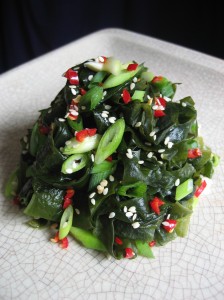Marie-Josee Denis
Montreal naturopathy
The composition of seaweed can vary from one variety to another but they are all rich in iodine, zinc, calcium(1), iron, magnesium and mineral salt. They also provide a good supply of amino acids, fibres, vitamins, minerals, phytonutrients(2) and trace elements.
In addition, these aquatic plants soothe the nervous system, promote bone health, nourish the glands and restore the alkalinity of the metabolism. They are low in calories and easy to assimilate and contain a gelatinous substance (agar agar) which promotes the feeling of satiety. Seaweed can be easily consumed to enhance your dishes in liquid, sheet or powder form.
Kombu
Recommended in cases of weakness of the thyroid gland, it contains vitamins A, B, C, calcium and potassium. It is a blood tonic (like all algae). Add it to cereal dishes and soups or sprouted legumes. Make a habit of adding them to the cooking of legumes as they tenderize them and help prevent flatulence.
Paddle
Sold in small filaments, it is rich in vitamins B1 and B12, calcium, potassium, iodine and protein and has a very good nutritional value. It is recognized by its tenderness and its sweet flavor which allows it to be eaten raw. After a short soaking of 5 minutes, it takes on the appearance of small black noodles. It is the seaweed that we appreciate from the first try. It can be added to salads, soups or served as a side dish.
Wakame
important to be interested in its traceability.
Atlantic Nori
With a fine and aromatic taste, this seaweed from Quebec contains 35 to 50% of its dry weight in protein. It is one of the few plant sources of vitamin B12. It contains a significant contribution in Iron, Vitamin A, B complex, C and E.
Most are familiar with this seaweed used mainly for making sushi. Add Nori to your soups, your salads, at the end of cooking with pasta, vegetables, fish.
Chlorella
Relieves fibromyalgia, increases the immune system, detoxifies and lowers cholesterol. Contains a lot of chlorophyll, polyunsaturated fatty acids, proteins, minerals and vitamins B12 and K.
(1) The enemies of calcium: chocolate, coffee, alcohol, fatty foods, chemical yeasts, cortisone and aspirin
(2) Phytonutrients or “phytochemical compounds” are molecules that plants produce to protect themselves from UV rays, insects or even certain diseases. They are known to be powerful antioxidants and are said to protect against cancer, cardiovascular disease and premature aging.
Marie-Josée Denis, N.D. Naturopath, M.Sc.
With the collaboration of Annie-Pierre Coutu



